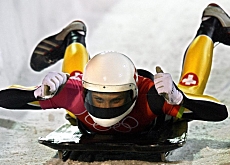Gold and silver for Switzerland

Maya Pedersen-Bieri has won the first gold medal for Switzerland in the women's skeleton event at the Turin Olympics.
Her victory was followed later on Thursday evening by figure skater Stéphane Lambiel’s second place behind the invincible Russian, Evgeni Plushenko.
Pedersen-Bieri hurtled headlong down the Cesana track on Thursday in a total time of less than two minutes on Thursday, beating her rivals by over a second.
Showing no fear in a headfirst, freezing freefall down one of the world’s fastest sliding tracks, the Swiss favourite completed her two runs in a combined one minute 59.83 seconds, 1.23 seconds ahead of Shelley Rudman of Britain.
Canada’s Mellisa Hollingsworth-Richards, the competition’s other favourite, won the bronze.
“It’s wonderful for all my family, especially my daughter, who has had to spend so much time with her grandparents lately,” said Pedersen-Bieri after her win. “It’s also compensation for all the time I have invested in this.”
The Swiss was the only athlete to complete one of her runs under one minute, staking her claim for the gold with a blistering 59.64-second first heat.
No mistakes
She said she was nervous before the start of the competition, but breaking the track record helped her calm down.
“I didn’t feel nervous at all before the second run,” she added. “It also helped that my main competitors all made mistakes.”
The Swiss, a two-time world champion, finished fifth at the Salt Lake City Games four years ago despite having the fastest time in the second run. She thought about retiring, but decided to stick around for another shot at gold.
She skipped the 2003-04 World Cup season because she was pregnant, but after giving birth to her daughter, Miriam, she came back to finish second in the world the next year.
Last year, she completed her climb back to the top with a win in the world championship.
Her victory means that she now holds the Olympic, World and European titles.
Best of the rest
In the men’s figure skating, Swiss Stéphane Lambiel has managed to earn himself a silver medal despite an injured right knee.
The reigning world champion finished well behind the winner and hot favourite for the title, Russia’s Evgeni Plushenko, but still managed to hold off a tough field led by Canada’s Jeffrey Buttle in the race for second place.
Lambiel, performing to Vivaldi’s Fours Seasons, was able to nail a quadruple-triple-double jump combination, mirroring Plushenko’s efforts just before him. But the Swiss could not keep up and fell or slipped as he landed on two of his jumps.
While he could not complete all his jumps, his artistic expression and footwork impressed the judges, enough at least to guarantee him a silver medal.
He finished fourth in Thursday’s free programme, after a third in the short programme on Tuesday.
Hardest fight
“I’m very proud to have held up to the end,” said Lambiel. “It was the hardest fight of my life.”
“I would have preferred a better performance, but given the circumstances, I managed to do my best.”
Lambiel was considered one of the Swiss team’s best hopes for a medal, until he injured his knee a few weeks ago.
It was even touch and go as to whether he would take part in Thursday’s free programme after hitting his knee again after a fall during training in Turin this week.
Lambiel is only the third Swiss to win a figure skating medal at the Olympics, after Georg Gautschi in 1924 and Hans Gerschwiler in 1948.
Plushenko crushed his opponents with a near flawless display that propelled him towards a new points record – 258.33, more than 27 ahead of Lambiel.
The Russian, who succeeds his compatriot Alexei Yagudin and picked up the only title that had eluded him until now, had already left the other competitors floundering in his wake after the short programme.
swissinfo with agencies
In skeleton racing, the athlete descends the bobsleigh track head first, their chin and toes only millimetres from the ice.
Balancing on an aerodynamic, rectangular steel and fibreglass sled, competitors reach top speeds of up to 130 kilometres per hour.
The first skeleton runs were natural tracks, built in Switzerland in the late 19th century and capitalised on the popularity of tobogganing.
The first known skeleton event was held in 1887, and the sport was re-introduced at the 2002 Winter Olympics in Salt Lake City.
Maya Pedersen-Bieri was born on November 27, 1972.
She is a two-time world champion, winning in 2001 and last year.
At the 2002 Winter Olympics, she finished fifth.
Born in Spiez, canton Bern, Pedersen lives with her husband Snorre and their daughter in Øyer, Norway.

In compliance with the JTI standards
More: SWI swissinfo.ch certified by the Journalism Trust Initiative











You can find an overview of ongoing debates with our journalists here . Please join us!
If you want to start a conversation about a topic raised in this article or want to report factual errors, email us at english@swissinfo.ch.